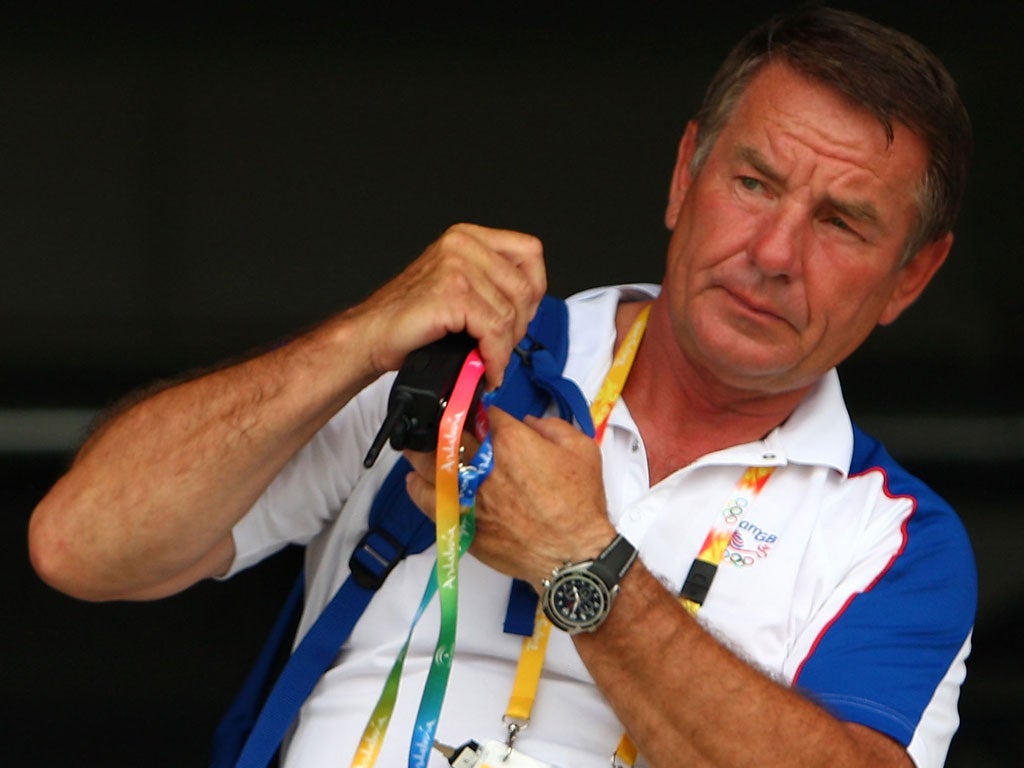The Last Word: Coach with a dark past has lit up rowing
Jürgen Grobler turned his own life around then remodelled the GB squad into world-beaters

Hazewinkel, a lake near Mechelen in Belgium, is a bleak place, where rowers are housed in eight rudimentary huts. When the rain is torrential, and you fear you may be about to ruin the life of a good man, it is uniquely forbidding.
I have never forgotten the alarm in Jürgen Grobler's eyes one wretched April morning 14 years ago. As we sat on metallic chairs in a small cafeteria, I produced photocopies of hand-written files, compiled by the Stasi.
East Germany's reviled security police had detailed all aspects of his personal and professional activities with dehumanising efficiency. We both knew the gravity of evidence linking him to a state-sponsored drug-abuse programme in sport. His position as chief coach of the GB men's squad was in peril.
"I know I cannot run away from my past," he said, in a soft and tremulous tone. "Some things that were going on at that time might not have been correct, but I can look everybody in the eye and not feel guilty. I am not a doping coach. I am not a chemist."
I believed him instinctively then. I believe in him implicitly now, as his 10th Olympic campaign gets under way in the altogether more hospitable setting of Eton Dorney. My respect for Grobler as a man, and as arguably the greatest current coach in world sport, is immense.
So why dredge up the past, at the risk of reviving a long-forgotten, quickly addressed whispering campaign? As perverse as it may sound, it feels appropriate because David Millar captained the British road cycling team yesterday.
It was a landmark occasion, the first time a convicted drug cheat represented Great Britain at an Olympics. To be honest, I was implacably opposed to him being allowed to do so. Doping still seems the easy way out, the ultimate betrayal.
But once Millar's selection was ratified, there was no option but to focus on the human being rather than the symbol. The cyclist embraces his past as the mirror image of how he lives now, as a clean athlete. That should be good enough for any right-minded observer.
Grobler and Millar represent an eternal truth: perspective in sport, as in life, is everything. People rushed to judge the exiled East German coach because an accident of birth dictated that he grew up in a totalitarian regime.
Critics did not know him, or the petty tyrannies of a world in which neighbours spied on each other, and lives were destroyed on a collaborator's whim. They did not know his sport. Rowing is attritional, confrontational, emotional.
When legs and lungs are aligned, and the synchronicity of stroke and recovery gives the boat a surreal weightlessness, it is a narcotic. When fatigue disconnects the brain from the body, and the throat burns dry and sour, it is a torment.
Someone with Grobler's record – he has produced gold medals at every Olympics since 1972, with the exception of 1984, which was boycotted by the Eastern bloc – has earned the right to be taken on trust. He has done it the hard way.
In the early days, when Steve Redgrave's legend was being developed, Grobler would work from a mildewed gym in which rat traps lined the walls. Athletes lay face down, on what seemed like butcher's slabs, to lift weights. The dawn sessions on a mist-fringed Thames were exquisite torture.
Watching Grobler work remains an education. When he speaks, in heavily-accented English, he doesn't waste words. His genius lies in recognising the uniqueness of each athlete, and in blending raw physiological data with intuitive assessments of character.
The last time we met, he confided he had turned down a huge offer to coach in China. He was immensely proud of his son. Aged 10 when the family moved from Magdeburg in January 1991, he had just completed his PhD at Oxford.
"This country has given me everything," Grobler said.
Maybe so, but he has given everything back.
Pearce's team are a sorry stunt
Football gatecrashes the Olympic Games like a drunken playboy. It secures entry to the party by the back door, seduces the housekeeper and bullies the owners into servitude.
The sport for "fit and proper" persons has no relevance to the human dramas which will enthral, and occasionally appal, over the next fortnight. Football should not be in the Games because the Olympics are not the sport's primary event. But the objection to its presence is deeper, and more heartfelt.
As befits a Sex Pistols fan, Stuart Pearce has No Future. His GB football team have been exposed as an instantly disposable marketing stunt.
FA flunkies took exception when I used Twitter to highlight the absurdity of the GB women's team "launching" the London Games, in Cardiff, 53 hours before the Opening Ceremony.
"Why is it wrong?" argued one. "Football can't fit a six-match tournament schedule into the smaller window of an Olympics, so it starts earlier." Er, hockey manages rather well in its time frame.
The FA's hidden agenda was duly revealed when the Games' formal opening was used to bury the news of disciplinary action against John Terry. Cynical, pathetic and utterly predictable.
Blame Games
Memo to bureaucrats and politicians congratulating themselves on an inspirational start to the Games: if the generation represented by the young athletes who lit the flame are betrayed by sport-funding cuts, we will know who to blame.
Subscribe to Independent Premium to bookmark this article
Want to bookmark your favourite articles and stories to read or reference later? Start your Independent Premium subscription today.

Join our commenting forum
Join thought-provoking conversations, follow other Independent readers and see their replies